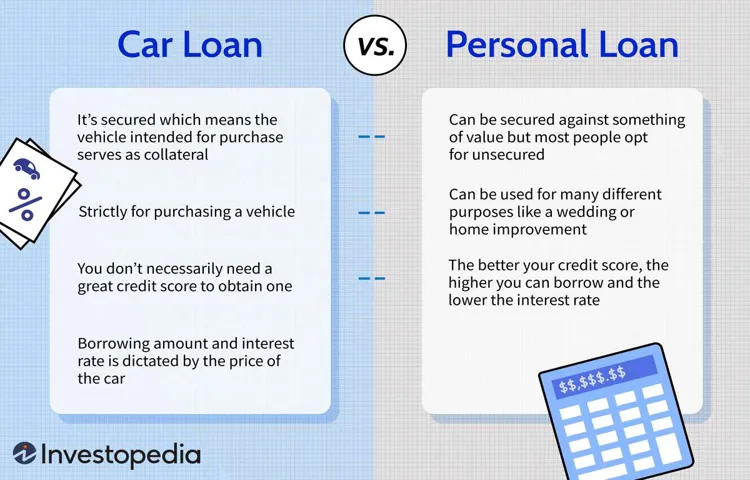Are you tired of paying multiple car loans at different interest rates every month? It can be overwhelming and stressful trying to keep track of the payments and due dates. Luckily, there is a solution: combining your car loans. This guide will explain everything you need to know about combining car loans, including the benefits, process, and potential drawbacks.
Think of combining car loans like merging onto a highway. Instead of trying to maneuver through multiple lanes and exits, you can simplify your journey by consolidating everything into one smooth ride. By combining your car loans, you can potentially lower your interest rate, reduce your monthly payment, and make it easier to manage your finances.
But, like any financial decision, there are some things to consider before taking the leap. You’ll want to look into the fees associated with combining loans and make sure the loan terms align with your financial goals. Additionally, combining loans may not be the best option if you have a low credit score or if one of your loans has a significantly higher interest rate than the others.
Overall, combining car loans can be a smart financial move for those looking to simplify their payments and potentially save money. Follow this guide to determine if combining your car loans is the right choice for you.
Table of Contents
What is Combining Car Loans?
Have you ever found yourself in a situation where you have multiple car loans and are struggling to keep up with payments? Combining car loans is a possible solution that can make your life a lot easier. By consolidating your car loans into a single loan, you simplify the process and potentially lower your monthly payment. This can be done by obtaining a new loan from a lender to pay off your existing car loans, leaving you with only one new payment to make.
Keep in mind that whether or not you can combine your car loans will depend on your credit score, income, and the value of your vehicles. It’s important to weigh the pros and cons and thoroughly research your options before moving forward. With the right analysis, you can find a solution that works best for you and your financial situation.
Definition and Explanation
Combining car loans is the act of consolidating multiple car loans into one loan to simplify payments and potentially save money in the long run. Essentially, this means taking out a new loan to pay off all existing car loans, creating a single monthly payment for all debts. Combining car loans can be beneficial for those who have multiple car loans with high interest rates, as it can reduce the overall interest rate and possibly lower the monthly payment.
This consolidation can also help improve credit scores by reducing the total amount of debt and making payments more manageable. It’s important to remember that combining car loans isn’t always the best solution for everyone, as it can come with fees and may not always result in lower payments.

Benefits of Combining Car Loans
“Can you combine car loans?” Yes, you can! Combining car loans has various benefits that can help you when you’re struggling with multiple monthly payments. By consolidating your car loans, you can lower your interest rates or extend your repayment terms, which can save you money in the long run. Additionally, merging loans can simplify your finances by reducing the number of bills you have to pay each month.
Moreover, combining loans can also improve your credit score by reducing your credit utilization ratio. Keep in mind that while combining car loans can have plenty of benefits, it’s vital to do your research and ensure that it’s the right decision for your financial situation. Check with your lender to see if they offer this option and make sure that you’re aware of any fees associated with consolidating your loans.
Overall, merging car loans is a great option for those who want to simplify their finances and save money on interest rates!
Lower Monthly Payments
Lower monthly payments are one of the main benefits of combining car loans. By combining multiple car loans into one, you can take advantage of lower interest rates, which usually translates to lower monthly payments. This can be especially beneficial if you’re struggling to make all your car loan payments each month, as it can make it easier to keep up with your financial obligations.
Additionally, combining car loans can help you simplify your finances by having just one monthly payment to worry about. This can save you time and stress, making it easier to budget and plan for your future. Overall, combining car loans has many benefits, and can be a great way to save money and simplify your finances.
Lower Interest Rates
Lower Interest Rates If you’re currently struggling to keep up with your car loan payments, you might want to consider consolidating them into one loan. There are many benefits to combining your car loans, one of which is lower interest rates. When you have multiple car loans, each one comes with its own interest rate.
These rates can vary based on the age and condition of the car, as well as your creditworthiness. Combining your car loans into one loan can help you secure a lower interest rate, which will decrease the amount of money you have to pay in interest each month. Not only will this save you money in the long run, but it will also make it easier to manage your finances, as you will only have one payment to keep track of.
Simplified Debt Management
Combining car loans can have several benefits when it comes to simplifying debt management. Firstly, it helps to reduce the number of monthly payments that a person needs to make. Having multiple car loans with different lenders means that a person has to keep track of several payments, making it challenging to manage their finances effectively.
Consolidating car loans into a single loan with a single lender makes it easier for individuals to keep track of their monthly payments and budget accordingly. In addition, combining car loans can result in lower interest rates, which can lead to significant savings in the long run. By negotiating a better interest rate with the lender, individuals can save money on interest payments over the life of the loan.
In conclusion, combining car loans is an effective way to simplify debt management and save money in the long run.
Requirements for Combining Car Loans
“Can you combine car loans” is a common question asked by people who have taken out multiple car loans and are looking for ways to simplify their monthly payments. The answer is yes, it is possible to combine car loans, but there are certain requirements that need to be met. First and foremost, the combined loan should not exceed the value of the car, as this can leave you with negative equity.
Additionally, you will need to have a good credit score and a steady source of income to qualify for a combined loan. It is important to shop around and compare the interest rates and terms offered by different lenders to ensure you are getting the best deal. Combining car loans can be a great way to save money and make your finances more manageable, as long as you meet the necessary requirements and take the time to carefully consider your options.
Good Credit Score
If you’re considering combining car loans, it’s important to have a good credit score. A good credit score shows lenders that you’re responsible with your credit and less of a risk to lend money to. Typically, a credit score of 700 or higher is considered good and will make you eligible for competitive interest rates.
In addition to a good credit score, lenders will also look at your debt-to-income ratio, employment history, and other financial factors to determine your creditworthiness. Combining car loans can be a smart financial move if you’re struggling to manage multiple loans or want to lower your overall interest rate, but it’s important to make sure you meet the requirements before applying. By having a good credit score and a solid financial history, you can increase your chances of obtaining a combined car loan that works for you.
Sufficient Income
When combining car loans, having a sufficient income is one of the most important requirements to keep in mind. Lenders want to make sure that you have the financial means to make your car payments on time and in full. They’ll typically look at factors such as your job stability, income level, and debt-to-income ratio when evaluating your loan application.
If you’re planning to combine car loans, it’s essential to have a steady source of income to increase your chances of approval. A good rule of thumb is to make sure your car loan payments don’t exceed 10-15% of your monthly take-home pay. This will help you keep up with your payments and avoid falling behind on your loan.
Remember, a combined car loan can be a great way to save money on interest and simplify your monthly payments, but it’s crucial to have the financial stability to maintain this type of loan. So, before committing to a combined car loan, make sure you have a steady income that meets the lender’s requirements.
Proof of Vehicle Ownership
Proof of vehicle ownership is a fundamental requirement when it comes to combining car loans. It’s important to show title ownership of the vehicle as a lender needs to ensure that the collateral for the loan is solely yours and has no other claimants. This is especially important when you’re going to re-finance or merge two loans into one.
The easiest way to prove ownership is by presenting the car’s title or registration. These documents show the vehicle’s particulars, including the name of the owner. If there are multiple borrowers on the loan application, each borrower mentioned will have to provide proof of ownership for a more streamlined and efficient process.
The borrower has to make sure that the documents are updated, and the vehicle is registered in their name; otherwise, it can severely delay the loan application process.
How to Combine Car Loans
“Can you combine car loans?” is a question many people asking themselves while juggling multiple car loans with varying interest rates. The good news is that it is possible to combine car loans, and it can have some benefits. By combining your car loans, you can save money on monthly payments, simplify your financial situation, and even improve your credit score with prompt payments on a single, consolidated loan.
To do this, you’ll need to find a lender who offers consolidated loans and meets your specific needs. You may also need to meet certain qualifications, such as having a good credit score, income, and equity in the car(s) eligible for consolidation. If you’re struggling to keep up with multiple car loans, consider combining them to streamline your finances and potentially save money in the long run.
Research Lenders
Combining car loans can be a smart financial decision if you want to lower your monthly payments and simplify your debt. When researching lenders, it’s important to compare interest rates, loan terms, and fees. Look for lenders that specialize in auto loans and have good reputations.
You can check reviews online or ask for recommendations from friends and family. When applying for a loan, make sure you have all the required documents, such as proof of income and insurance. Keep in mind that combining car loans may not be the best option for everyone.
It’s important to consider your financial goals, budget, and credit score before making a decision. A reputable lender can help guide you through the process and provide information on the best options for your specific situation.
Compare Loan Terms and Rates
Combining car loans can be a smart financial move, especially if you’re struggling to keep up with multiple payments. However, before applying for a new loan, it’s important to compare loan terms and rates to ensure that you’re getting the best deal possible. Check out different lenders and compare their interest rates, loan terms, and any other fees associated with the loan.
Remember that a longer loan term may offer lower monthly payments, but it can also mean paying more in interest over time. On the other hand, a shorter loan term may have higher monthly payments, but you’ll save money on interest in the long run. By doing your research and comparing options, you can make an informed decision and choose the best car loan to meet your needs.
And don’t forget, combining your car loans can help simplify your finances and make budgeting easier in the future.
Apply for Combination Loan
Combining car loans can be a smart financial move for those looking to simplify their payment schedules and potentially save money on interest rates. To start the process, it’s important to first gather all the necessary information, including the current loan balances, interest rates, and payment due dates. From there, it’s a matter of finding a lender who offers combination loans and submitting an application.
Keep in mind that while a combination loan can make managing debts easier, it’s important to also consider the long-term financial impact and ensure that it aligns with one’s overall financial goals. By doing so, individuals can take control of their debts and work towards a more secure financial future.
Conclusion
In the world of financial lingo, combining car loans may seem like a complex concept. However, with the right research, planning, and execution, it can be a smart and efficient way to manage your car-related expenses. By combining car loans, you not only streamline your debt into one manageable payment, but you may also be able to secure better interest rates and potentially free up some much-needed cash flow.
So, if you’re ready to hit the road to financial freedom, consider combining your car loans and enjoy the ride!”
FAQs
What are the benefits of combining car loans?
Combining car loans can help you lower your monthly payments and potentially reduce the interest rate you are paying on your loans.
Can I combine car loans from different lenders?
Yes, you can. You can apply for a new loan from a lender who will pay off your existing car loans.
How do I qualify for a car loan consolidation?
To qualify for a car loan consolidation, you need to have a good credit score, a stable income, and sufficient equity in your car.
What are the risks of consolidating car loans?
The risks of consolidating car loans include extending the duration of your loan, potentially increasing your overall interest payments, and risking default if you cannot repay your loan.
How long does it take to consolidate car loans?
The length of the car loan consolidation process varies depending on the lender and your creditworthiness. However, it can take between several days to a few weeks.
What are the fees associated with consolidating car loans?
Some lenders may charge application fees, processing fees, or prepayment penalties. It is important to read the terms and conditions carefully to understand all the fees associated with consolidating car loans.
Can consolidating car loans affect my credit score?
Applying for a new loan to consolidate your car loans may affect your credit score temporarily. However, if you make timely payments on your consolidated loan, it can help improve your credit score over time.



